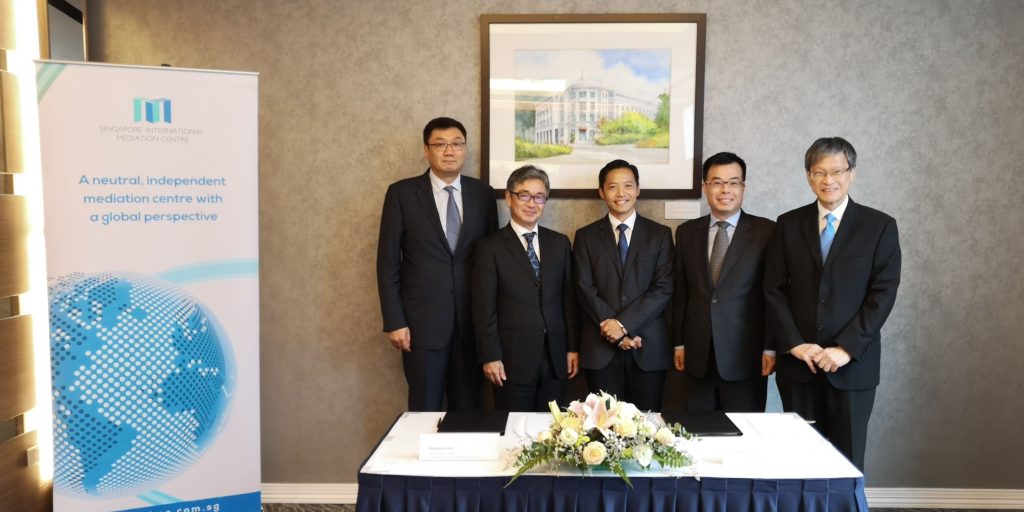SIMC and ADB ink MOU to provide dispute resolution expertise for PPP infrastructure projects in Asia Pacific
SINGAPORE (July 11, 2018)—The Singapore International Mediation Centre (SIMC) and the Asian Development Bank (ADB) today signed a Memorandum of Understanding (MOU) to help public and private parties resolve disputes that may arise in infrastructure public-private partnership (PPP) projects, under ADB’s Infrastructure Referee Program (IRP).
SIMC and ADB will also work together to promote mediation and other infrastructure PPP dispute resolution mechanisms to the developing member countries of ADB.
The MOU was signed today at Maxwell Chambers by Mr Yoji Morishita, ADB’s Head of the Office of Public Private Partnership and Mr Aloysius Goh, SIMC’s Chief Executive Officer.
The collaboration marks the start of a strategic relationship between SIMC and ADB to advance the development of sustainable PPPs in the Asia Pacific region. It is also part of Singapore’s larger effort to establish itself as an international dispute resolution hub and infrastructure hub.
Under the MOU, SIMC will work with ADB to establish a panel of international mediators and experts with experience and skills in dispute resolution of infrastructure PPPs. Through the IRP, panellists will provide an independent third- party opinion to resolve disagreements that may arise over the life of a PPP project.
Minister in the Prime Minister’s Office and Second Minister for Finance and Education, Ms Indranee Rajah S.C., said, “As a leading financial centre, Singapore has been a centre for structuring and financing many of the infrastructure projects in the region. We are also home to strong professional service providers, including accountancy, engineering, and project management firms, as well as law firms, which have project financing and dispute resolution expertise. This partnership demonstrates Singapore’s role in facilitating infrastructure projects and promoting collaboration between private and public entities.”
Signing the MOU on behalf of ADB, Mr Yoji Morishita, Head of the Office of Public-Private Partnership, said, “Many of the infrastructure PPP projects in recent times have been unsuccessful because of poor quality preparation and structuring by public sector agencies. This has added an additional layer of complexity to the negotiation and operation of the projects and the consequent dispute.
“We look forward to SIMC’s support to reduce the time and cost of resolving the disagreements between the public and private sector parties and facilitate successful delivery of bankable PPP projects through the IRP. This will go a long way towards mobilising quality support for our developing member countries at the critical stage of project development and helping them to meet their infrastructure needs.”
Mr Aloysius Goh, SIMC’s Chief Executive Officer, said, “The MOU is a strong endorsement of the quality of Singapore’s international dispute resolution services. Infrastructure projects are complicated and occasional disagreements along the way are sometimes inevitable. However, many of these can be prevented and their impact, mitigated, if the right dispute resolution expertise and process were available to the parties.”

 SIMC Chief Executive Officer Mr Aloysius Goh (Middle) and Mr Yoji Morishita (second from left), ADB’s Head of the Office of Public-Private Partnership, today signed an MOU
SIMC Chief Executive Officer Mr Aloysius Goh (Middle) and Mr Yoji Morishita (second from left), ADB’s Head of the Office of Public-Private Partnership, today signed an MOU
to provide dispute resolution expertise for PPP infrastructure projects. Also present at the signing ceremony were Mr Almaz Galiev (far left), Principal PPP Specialist from ADB; Mr Han Kok Juan (second from right), Deputy Secretary from the Ministry of Law; and Mr Chow Kok Fong, SIMC Board Member. Photo: SIMC.
SIMC Board Member and former CEO of Changi Airport International, Mr Chow Kok Fong, himself a leading construction adjudicator and mediator, said, “This partnership with ADB opens up a new regional dispute resolution option for construction industry professionals based in Singapore and the region. SIMC has been actively deepening our capacity to resolve complex cross-border disputes to support the growth in infrastructure investments in Asia. A successful settlement rate of over 80 per cent was achieved in 2017 and we look towards working with ADB to share our experience and expertise.”
Ms Koh Swee Yen, Partner at Singapore law firm Wong Partnership, said, “This MOU demonstrates ADB’s confidence in Singapore’s capability as a hub for resolving complex cross-border disputes. Interestingly, the use of mediation for high-value infrastructure disputes in Asia has not gained the level of traction as one would expect. I firmly believe that Singapore, with its strong track record in international commercial dispute resolution, can lead this move in promoting the use of mediation for these disputes in the region.”
Mr Eugene Tan, Partner at international law firm Clyde & Co, said, “I am encouraged by this collaboration between ADB and SIMC. This MOU shows that Singapore’s reputation as a transparent and neutral location has served us well, and that we play an important role in facilitating the region’s development needs. The establishment of this panel of experts will help parties identify the best professionals to resolve differences that may arise in the course of the infrastructure projects.”
The collaboration comes as Asia Pacific is set to be one of the fastest growing economies in the world, spelling the need for a robust, resilient dispute resolution framework for sustainable long-term economic growth.
ADB estimates that infrastructure needs in developing Asia and the Pacific will exceed $1.7 trillion annually through 2030. Available funding from government funds falls far short of the investment need. PPPs can play an important role in addressing this massive requirement. However, the flow of private infrastructure investment has been known to be impeded by a lack of reliable and investor-friendly regulatory and legal conditions.
This collaboration is expected to spur greater involvement by the private sector to improve efficiency as well as asset and service quality in the region’s infrastructure projects.

